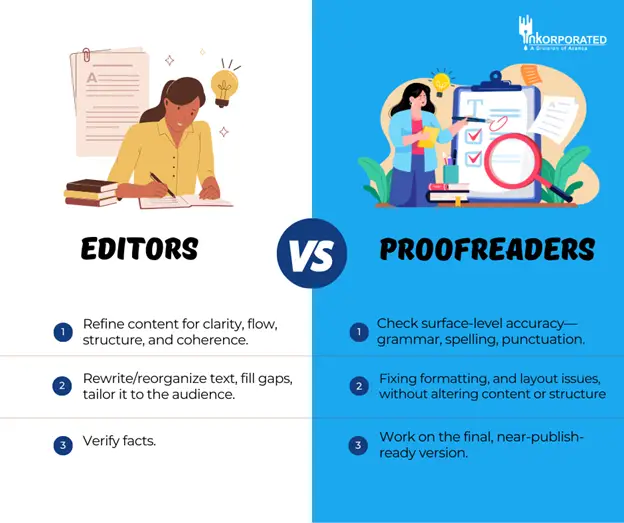Consistency is key. Whether you’re aiming to boost profits or climb to the top of Google search results, the advice remains the same: stay consistent. Thanks to AI, producing content in bulk has never been easier. But this convenience comes at a cost; the internet is now saturated with generic, repetitive, and impersonal content. What’s missing? Fresh ideas. Real insight. Human touch.
Many businesses have leaned too heavily on AI tools, losing sight of their unique voice and expertise. Instead of adding value and standing out, they are blending into the noise. As a result, the demand for high-quality, relatable content is rising—and AI alone can’t deliver it. Yet not every company has the time, resources, or in-house talent to meet this demand. That’s where outsourcing proofreading and editing for your content writing becomes a strategic advantage.
In this article, we’ll explore why outsourcing your proofreading and editing needs is one of the smartest moves you can make to stay competitive, relevant, and top of mind for your audience.
Let’s dive in.
Editing vs. Proofreading: Key Differences Every Global Business Should Know
Many people assume proofreading and editing are the same thing; and it’s an easy mistake to make. While they may seem similar, each plays a distinct role in the content creation process.
Editing
Editing comes first and focuses on the big picture. Editors improve the structure, clarity, and flow of your writing. They refine sentence construction, enhance tone, eliminate redundancy, and ensure your message is clear and effective for your target audience.
What it includes:
- Rewriting awkward and unclear sentences
- Improving word choice and tone
- Reorganizing ideas for better flow
- Removing redundant content or repetitive information
- Ensuring logical progression and clarity
“A good editor is someone who cares a little less about the author’s needs than the reader’s.”
Dene October, author of Marco Polo and Enchanting David Bowie
Proofreading
Proofreading, on the other hand, is the final check before publication. It’s all about catching surface-level errors: typos, spelling mistakes, punctuation issues, and formatting inconsistencies.
What it includes:
- Fixing typos and spelling errors
- Correcting grammar and punctuation
- Checking formatting consistency
- Spotting small, overlooked mistakes
“A proofread is not the final pass of a copyedit as it does not deal with correcting grammar or mechanics, and so in no way should it stand in place of one. Rather, I like to think of this stage as sweeping away the pencil shavings left by other rounds.”
Example:
You write an article and share it with us (Contact for free consultation).
The article includes this sentence:
“The company made significant profits thanks to its M/S growth.”
Our editor might say:
“This sentence is unclear. Can you rephrase it? ‘Significant’ is vague; consider replacing it with specific data, such as: ‘made profits of USDXX, a YoY growth of XX%.’ Also, ‘M/S’ may not be clear to all readers — please write out the full term ‘market share.’
Additionally, specify which market the share refers to and by how much it grew.”
Our proofreader would say:
“You misspelled ‘profits.'”
“Add a comma before ‘thanks to.'”

Source: Inkorporated
Why Outsourcing Proofreading Can Boost Your Global Brand’s Credibility
There are a variety of reasons to outsource your editing and proofreading needs, but primarily to cut costs, gain access to pros, and increase efficiency. Many a times, some founders are the chief-of-all-things because hiring talent when you are just starting out, and without a continuous revenue stream, is expensive and risky. By outsourcing, your company can focus on its core business activities while delegating non-core functions to external professionals, leading to improved operational efficiency and potentially significant cost savings.
7 Reasons Global Enterprises Should Outsource Proofreading in 2025
1. Create Content That Actually Sells:
Let’s get one thing straight: content isn’t just words on a page, it’s how your audience decides whether they can trust you, buy from you, or scroll right past you like yesterday’s news. When you outsource your proofreading and editing, you’re handing that responsibility over to professionals who actually know what they’re doing.
Here’s what great editing actually delivers:
- Content builds trust — bad content loses it.
- Great editing makes your message clear, human, and persuasive.
- AI-generated content still needs human refinement.
- Editors shape, clean, and elevate your copy for real results.
2. Receive Feedback That Doesn’t Sugarcoat
Every writer needs an editor. Period.
Why? Because most writers are way too close to their work to be objective. When we write something, we know what we meant to say, so our brain fills in the gaps and skips over the clunky sentences. We miss the awkward phrasing and the typos.
That’s where an outside editorial perspective makes all the difference:
- Writers are too close to their own work to be objective.
- Editors offer unbiased, actionable feedback — no fluff.
- Sharp edits improve clarity, tone, and conversion.
- Outsider perspective = stronger, more persuasive content.
3. Get Work Done on Your Schedule
Here’s the thing about in-house editors, they work business hours. At Inkorporated, we’ve built our systems to handle serious volume. Whether you’ve got one landing page or 100 blog posts, we’ve got the people, the processes, and the caffeine to turn it around fast, without cutting corners.
Outsourcing gives you the kind of speed and flexibility internal teams just can’t match:
- In-house editors have limited hours.
- Outsourcing = flexible, scalable, 24/7 editing support.
- Quick turnaround for high-volume content.
- No bottlenecks or delays.
4. Have More Time for Core Business, Less Time Staring at MS Word’s Suggestions
Proofreading your own content is a time-sucking, brain-numbing spiral. You start off fixing a few typos… and somehow, three hours later, you’re still debating whether “email” needs a hyphen, especially when Word underlines literally everything in red and blue, and suddenly you’re questioning your entire grasp of the English language.
Yeah. You’ve got better things to do.
Here’s why handing off the editing saves your time — and your sanity:
- Self-editing wastes time and drains focus.
- Let editors handle the polish while you grow your business.
- No micromanaging — just clean, professional content.
- Saves you from grammar-induced headaches
5. Save Money (and a Whole Lot of Embarrassment) in the Long Run
Studies consistently show that consumers prefer to buy from brands they trust. Every piece of content is either building your credibility… or quietly chipping away at it. So yes — outsourcing editing might cost you upfront. But skipping it? That’s the real expensive move.
When you do the math, here’s why outsourcing wins:
- Outsourcing = pay only when needed, no full-time salary.
- Avoid costly brand damage from sloppy content.
- Flexible pricing, lower overhead.
- Clean content builds trust and drives sales.
6. Generate Content With SEO in Mind Without Playing Keyword Bingo
Want your content to show up when your audience types something into Google? Of course you do. But writing SEO-friendly content these days isn’t as simple as sprinkling in keywords like digital fairy dust—jamming in “best marketing agency” twenty times in a single paragraph just won’t cut it.
It takes strategy. It takes intention—not something that reads like it was written by a bot with a checklist. And let’s be honest: it takes time most businesses don’t have.
Here’s how professional editors help your content rank without sounding robotic:
- Editors optimize naturally, not robotically.
- SEO today is about matching user intent.
- Edited content ranks, resonates, and performs.
7. Speak to a Global Audience—Literally!
Let’s be honest, if you’re putting content out into the world, you’re not just writing for one tidy little audience tucked into one tidy little country. You’re talking to everyone; unless you want your US readers wondering what a “lorry” is or your UK audience cringing at “color” without the “u,” you’re going to need some help. Here’s where editors and proofreaders come in. Think of them as your language diplomats.
Here’s how they make your content truly global-ready:
- Editors adjust tone and vocabulary by region.
- Avoid awkward or offensive cultural mix-ups.
- Global-ready content, without total rewrites.
So, if you want content that works everywhere — not just where you are — maybe it’s time to outsource your editing needs to the ones who know how to make words work across borders.
Need help with that? You know where to find us.

